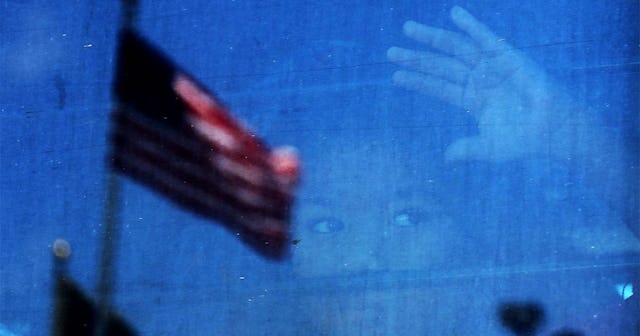Detained Immigrant Children Need To Be Protected From COVID-19 Too

I’ve been co-sleeping with my daughter a lot these days. As the coronavirus pandemic has forced families like mine indoors, I’m doing everything I can to help my 4-year old feel safe during a tremendously unsafe time. She’s been exhibiting regressive behaviors and she incessantly begs to Facetime with friends and loved ones just moments after they’ve already ended the call. She doesn’t understand why our lives have changed so much, so quickly.
My little girl is confused, stressed out, and isolated at home with a baby brother and two tired parents who are working long hours as they also deal with their own mental health struggles. As tough as this situation is, I take comfort in knowing that we are at least all in this together as we hunker down and wait for what’s next. And I’m beginning to realize with gratitude and heartbreak that our ability to keep our family intact is an immense privilege.
Right now, there are children just like my daughter who are completely alone. In cages. They are also confused, stressed out, and isolated. They will never receive the comfort they so deeply need from parents who can lovingly protect them during this time. On top of already experiencing so much trauma from being detained without their families, these kids are being re-traumatized as they try to cope with the chaos of a global pandemic.
These are the immigrant children currently being detained in holding centers across our country, and they deserve as much love, stability, and comfort as my daughter does.
On Monday, March 30, a federal judge in Los Angeles ordered the government to make every effort to release these children from custody by April 6th, after discovering that four kids had already tested positive for COVID-19 in a federally licensed NYC shelter and at least one was already being held in isolation. While there are roughly 3,300 kids in ICE custody with their parents, there are also at least 3,600 being detained across the country without any caregivers. The Trump administration is also currently facing multiple lawsuits urging them to immediately close immigration courts and release migrants from detention facilities, since there are currently no official COVID—19 protections in place and the deplorable living conditions are making it dangerously easy for the virus to spread.
Some major policy changes need to occur, but what can be done to ensure their immediate safety?
Shoes are left by people at the Tornillo Port of Entry near El Paso, Texas, June 21, 2018 during a protest rally by several American mayors against the US administration’s family separation policy. BRENDAN SMIALOWSKI/Getty
According to Katie Peeler, a pediatric critical care physician at Boston Children’s Hospital, our government needs to step up in big ways to aid in protecting the kids currently being detained. “ORR must ensure all staff and children understand the CDC guidance surrounding social distancing and personal hygiene and robustly stock their shelters with soap, hand sanitizer, cleaning supplies and food,” Peeler writes in a commentary piece for 90.9 WBUR. “Medical triage guidelines must be clear and practiced, and mental health support should be provided for all.”
The pediatric physician is also a medical expert with Physicians for Human Rights and has learned from personal experience that many of the children in custody came from countries known for overwhelming gang violence and governmental neglect. Which means that providing these kids with mental health support at all times is not only helpful, but critical. “After often long and extremely dangerous journeys, they arrive at the Mexico-U.S. border already severely mentally and physically traumatized,” she explains.
Beyond this, Peeler urges DHHS to safeguard the children who have just arrived in the United States, to prevent them from contracting and spreading COVID-19. “DHHS must step-up high-level screening for safe sponsors of children immediately upon arrival to the border,” she writes. “They must expeditiously place children with such sponsors, thereby avoiding feeding into an already overcrowded shelter system.”
A 4-year-old Honduran girl carries a doll while walking with her immigrant mother, both released from detention through the “catch and release” policy. LOREN ELLIOTT/Getty
Finally, immigrant court proceedings need to be placed on hold, and accommodations have to be made to offer alternative resources to ensure that national social distancing practices can be maintained. “Flexibility should be given to legal service organizations, so they can utilize videoconferencing or individual meetings when possible,” the pediatric physician shares.
Ignoring Peeler’s sound recommendations could result in a whole lot of vulnerable children suffering with no relief in sight under the government’s watch. It could also mean a longer isolation period for us all, as places like these holding centers fail to protect the human beings inside – and outside – of them. But at the heart of this urgent issue are a large group of kids that our government has essentially discarded at a time when no one should be left behind. As a mother and stepmother, this will never be okay with me.
These innocent children are human beings, just like your kids and mine. They deserve so much better. It is not their fault that they were born into conditions so traumatizing that they had to flee their home country. They did not ask to be imprisoned in a governmental system that has, infuriatingly, placed their needs at the bottom of the national priority list. In fact, they did not ask for any of this.
Right now, the most humane thing we can do is remove these kids from the holding centers they are mentally and physically languishing inside of and place them into safe, supportive foster and sponsor homes. And until that day happens, our government needs to start ensuring their basic needs and safety during this pandemic, because these children should not be left to fend for themselves.
This article was originally published on